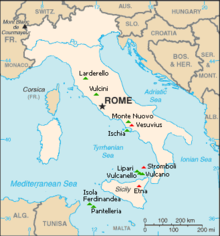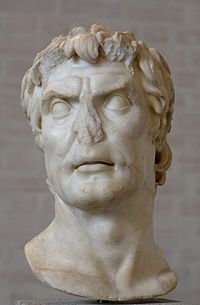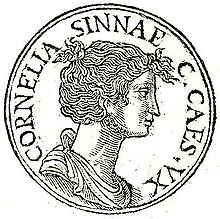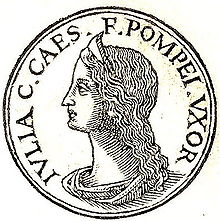- Lucius Cornelius Cinna
-
Lucius Cornelius Cinna 
A map of Italy Consul of the Roman Republic In office
87 BC – 86 BCPreceded by Lucius Cornelius Sulla and Quintus Pompeius Rufus Succeeded by Lucius Cornelius Cinna and Gaius Marius
(Suffect: Lucius Valerius Flaccus)Consul of the Roman Republic In office
86 BC – 85 BCPreceded by Lucius Cornelius Cinna and Gnaeus Octavius Succeeded by Lucius Cornelius Cinna and Gnaeus Papirius Carbo Consul of the Roman Republic In office
85 BC – 84 BCPreceded by Lucius Cornelius Cinna and Gaius Marius
(Suffect: Lucius Valerius Flaccus)Succeeded by Lucius Cornelius Cinna and Gnaeus Papirius Carbo Consul of the Roman Republic In office
84 BC – 83 BCPreceded by Lucius Cornelius Cinna and Gnaeus Papirius Carbo Succeeded by Lucius Cornelius Scipio Asiaticus Asiagenus and Gaius Norbanus Personal details Born Rome, Roman Republic Died 84 BC
Roman RepublicLucius Cornelius Cinna[1] (died 84 BC) was a four-time consul of the Roman Republic, serving four consecutive terms from 87 to 84 BC, and a member of the ancient Roman Cinna family of the Cornelii gens.
Cinna's influence in Rome exacerbated the tensions which existed between Gaius Marius and Lucius Cornelius Sulla. After the death of Marius, he became the leading power in Rome until his own death. His main impact upon Roman politics was his ability to veil his tyranny and make it appear that he was working under a constitutional government. His policies also impinged on Julius Caesar, who married his daughter.
Contents
Rise to power
Not much is known about Cinna before his bid for the consulship of 87 BC. He had praetorian rank in the Social War (91-88 BC), and had most likely also been praetor previous to this time. Cinna was elected as Roman consul in 87 BC, but historians disagree about who supported his election and what his own original political goals and causes were. All seem to agree on a basic chain of events however. Cinna was elected at a time when Sulla (the current consul) was very unpopular with the lower classes and the Latin allies, because he had sided with the Roman Senate, blocking the advancement of their rights as citizens. The people had intentionally elected candidates (probably for Tribune) who were not supported by Sulla.[2] Sulla had a little more control over the election for consul, or at least, had enough power to be certain no one who supported his rival, Marius could be elected.[3]
Sulla seems to have supported Cinna as a compromise candidate, but clearly did not trust him, as seen from an anecdote from Plutarch. Immediately after Cinna’s election, Sulla made Cinna swear loyalty to him by taking a stone up to the Capitol and cast it down, “praying that, if he failed to preserve his goodwill for Sulla, he might be thrown out of Rome as the stone was thrown out of his hand.” [4] Somehow then, Cinna had enough support to be elected. Various theories on who supported him and why are postulated based on what he did while in office, but all agree, Sulla was correct in his distrust. Gnaeus Octavius was elected as Cinna’s colleague under relatively similar circumstances, though Octavius probably had more support from Sulla.[5]
First consulship and exile
One of Cinna’s first decisions as consul was to not let his oath to Sulla influence his decisions as consul. Cinna argued that the oath should not prevent him from helping the people of Rome. Soon after this, Cinna sought to remove Sulla from the city. He brought some sort of charge against Sulla soon after coming to power. Sulla, rather than facing the charge, escaped with his army and led them to fight the army of Mithridates VI of Pontus in Boeotia.[6] This left only Octavius and the Senate to defend the causes of Sulla in Rome. Cinna eventually supported many causes, which leads to some debate concerning his original goals and to accusations that he chose his issues based on bribes.
Two causes predominated, that of the exiles and that of the Italians. Marius and his supporters, as well as many prominent supporters of Publius Sulpicius Rufus had been exiled from Rome under Sulla’s rule, but were still very popular amongst the people. It is clear that there were later connections between Cinna and this group (see “Exile and Alliance with Marius”), but it is not clear at what point he took up this cause.[7] The other cause, to which Cinna can be more clearly connected, is that of the “Novus Homo” or “New Citizens.” These were members of Italian tribes who had been promised citizenship as a condition of peace in the Social War. Technically they had been given citizenship, but in such a way that they had no real power. Cinna, even before his election, seems to have favored this cause. Certainly after his election, he worked to increase their rights, fighting against Octavius, who tried to maintain the status quo.[8] This feud ended in one of the largest street fights ever to occur in Rome, between the supporters of Octavius and the supporters of Cinna.[9] Although Appian stated that Cinna had no support from the “old citizens” in anything, including the street fight, this is highly unlikely, as none of his laws would have been a threat without at least some support from this quarter. Why the “old citizens” supported him, and how many of them supported him, is entirely unknown.[10] Octavius used the street fight to justify exiling Cinna immediately, deposing him of his office and citizenship,[11] an accusation that seems to have stuck with many historians, who accused Cinna of acting as a dictator.[12] The deposition of Cinna was unconstitutional and the only instance of its kind in the history of the Roman Republic.[13]
Preparations while in exile
Cinna then began to raise an army from the Italian countryside. His connections with the Italian groups seem to have been quite strong, as they quickly joined his forces (although accusations of bribery abound among the ancient historians [14]). At this point, the connections between Marius and Cinna become quite clear.[15] Because they shared the support of the Italians, Cinna was willing to join forces with Marius. Together they planned to retake the city.[12] Cinna and Marius’ army moved through the countryside, cutting off supply routes and cities used for food storage from the city.[16]
Invasion and slaughter of Rome
The first major battle of the conflict occurred at the Janiculum, where Octavius’ forces prevailed, but with heavy losses, including the general Pompeius Strabo. This demoralized Octavius’ army, but did not hinder the siege of Cinna and Marius, further weakening Rome. Eventually, after various skirmishes around the outskirts of Rome, negotiators secured Cinna’s assurance that he would not “willingly cause anyone’s death on reentering Rome.”[17] Thus, in late 87 BC, Cinna was reinstated as consul and the armies reentered the city. As Cinna and his bodyguard entered, however, Marius refused to enter Rome until his exile was officially repealed. The senate quickly began to vote to approve this, but before they were finished, Marius gave up all pretense and entered the city with his bodyguard, the Bardyiae. This unit consisted of Marius’ slaves who killed at Marius’ orders. Marius, according to the ancient historians, filled the city with blood, slaughtering anyone who remotely supported Sulla, had a lot of property, or was a personal enemy of Marius.[18] These claims are most likely exaggerated, as they do not appear in Sulla’s memoirs, a location which would seem biased against Marius.[19] These seem to appear later, but all agree that Cinna distanced himself from the indiscriminate slaughter, only ordering the deaths of Octavius and others who were direct political threats.[20]
Eventually, “Cinna had had enough of murder,” and he and Quintus Sertorius, a general who supported Marius and later governed Spain,[21] had their troops ambush the sleeping Bardyiae, ending their reign of terror.[22] Soon after this, in 86 BC, Marius and Cinna were reelected for consulship. Seventeen days after attaining his much sought seventh consulship, Marius died.[23] This began the era many historians have termed the “Dominatio Cinnae,” (the Domination of Cinna.)
Dominatio Cinnae
What occurred during this period is not as well documented as other parts of Cinna’s life. After the death of Marius, Lucius Valerius Flaccus (suffect consul 86 BC) succeeded him. Flaccus’ major contribution was to submit a bill attempting to solve a financial crisis. The Social War had caused a financial depression, resulting in exorbitant interest on loans and collapsing financial confidence in Rome after the start of the Mithridatic War. Counterfeiting became rampant, forcing Cinna and the government to develop testing stations to discover the false coins and replace them with good ones.[24]
In 85 BC, Cinna attempted to revive Sulpicius’ bill to solidify the citizenship of the Italian groups, but it was not in practice quickly as the census the next year lists 463,000[25] citizens. This is not a large enough increase from 115/114 BC, where the total was 394,336 to have included the Italians.[26] Much of what Cinna’s attention while ruling Rome was focused on was dealing with Sulla. Flaccus soon took over the war against Mithridates, which Sulla interpreted as a threat; he then moved to intercept Flaccus.
Flaccus was disliked by his soldiers and many deserted to Sulla. That any remained was due to the legate Fimbria, who used his popularity and influence with the troops to convince them to stay. This did not benefit Flaccus for long though, as Fimbria later had the army rebel against Flaccus and continue against Mithridates under his own leadership. Fimbria tried to offer peace with Sulla, but Sulla and Mithridates were already in negotiations which were favorable to both parties, therefore negating any necessity for Fimbria’s offer to Mithridates. After confirming peace with Mithridates, Sulla went to negotiate with Fimbria, at which point Fimbria’s army deserted to Sulla and Fimbria committed suicide.[27]
After finishing his war, Sulla returned to Italy. He sent out letters to the Italians in order to sooth the fear that he would take away their citizenship.[28] Sulla also sent a letter to the Senate regaling them of his victories over Mithridates and assuring them that he had received those exiled by Cinna and that he would provide swift retribution to those who were guilty of causing himself and the Senate to suffer.[29] Cinna and his colleague, Carbo, prepared for war. They postponed the elections of that year, declaring themselves reelected so that they would not have to return to Rome early to participate in an election. It is unlikely that this was contested because Cinna and his allies had enough power that no one dared to run in opposition to them.[30] Although this complied with the constitution, it allowed Cinna to act as monarch while still appearing to follow the will of the population. As Cinna and Carbo doubled their efforts for war with the looming threat of Sulla, Cinna was unaware that it would not be battle, but his preparations for war which would cost him his life.[31]
Death
Cinna was murdered in a mutiny of his own soldiers in 84 BC. He had been working to transport his troops across the Adriatic in order to meet Sulla on foreign soil. The troops were not relishing the upcoming fight, which promised no booty. Their dissatisfaction was increased when they heard that the second convoy of troops who had been in transport had been shipwrecked in a storm. Those that survived had returned to their homes. Cinna ordered an assembly in order to terrorize the troops back into obedience. One of his lictors struck a soldier who had been standing in the way as Cinna entered the gathering and when the soldier hit back Cinna ordered his arrest. This caused another soldier to throw a stone at Cinna, which struck him. The spirit of the mob then took hold as more missiles were thrown and the nearest soldiers stabbed Cinna to death.[32]
Plutarch tells a slightly different story, stating that Pompey visited Cinna’s camp and escaped accused of doing some wrong. The soldiers assumed that Cinna had helped Pompey escape and killed Cinna for this breach of their trust.[32] In either account, Cinna was murdered not due to his politics, but as more of a brief flare up of the mob spirit within his troops. Christoph Bulst argues that Cinna was killed in “an absolutely un-political mutiny,” pointing out that there is no mention of specific opposition against Cinna, and that he did not even feel the need to travel with a bodyguard.[33]
Family
Cinna was married to Annia, who was the daughter of Annius (unidentifiable). They had two daughters and a son. One of his daughters married one of Cinna’s supporters named Cn. Domitius Ahenobarbus. His other daughter, Cornelia, married Julius Caesar around 86 BC and died in 69 BC after bearing a daughter Julia.[34]
Cinna’s son, the younger Lucius Cornelius Cinna, fled Italy when Sulla returned, most likely to Spain. He returned briefly in 78 BC to help in the rebellion of Lepidus, then again fled to Spain after the plot fell through. He was able to return to Rome in 78 BC due to Lex Plautia, which extended an amnesty to all exiles of the civil war era. The son of this Cinna was Gnaeus Cornelius Cinna Magnus, who was pardoned twice, once after his support for Marc Antony, then again later for conspiracy against the emperor Augustus. Surprisingly he was then honored as a consul in AD 5 with the Emperor.[35]
Cinna's legacy
Lucius Cornelius Cinna was important within Roman history. He played an important role in the dispute between Gaius Marius and Lucius Sulla, allowing Marius to return to Rome for his seventh consulship. Cinna’s rule was not well documented and many argue that his only goal was his own advancement. His alliance with Marius was to better his interests rather than as a statement of his politics. He attempted to become a tyrant behind a veiled disguise of a republic under a strict constitution.[36] His only real cause was that of the equalization of the Italian groups.[37] Although he was not as well documented as his contemporaries, Cinna was still an essential player in the fall of the system of the Roman Republic, ushering in a thinly veiled form of tyranny.
Notes
- ^ Latin: L·CORNELIVS·L·F·L·N·CINNA; English: "Lucius Cornelius Cinna, son of Lucius, grandson of Lucius".
- ^ Harold Bennett, Cinna and His Times: A Critical and Interpretive Study of Roman History During the Period 87–84 BC (Menasha, WI: The Collegiate Press, 1923), 1–5.
- ^ Robin Seager, “Sulla,” in The Last Age of the Roman Empire. The Cambridge Ancient History. Vol IX. Great Britain: Cambridge University Press, 1994.
- ^ Plutarch, “Sulla,” in The Fall of the Roman Republic, trans. Rex Warner (London: Penguin Books, 2005), Section 10.
- ^ C. Meinhard Bulst, “‘Cinnanum Tempus’: A Reassessment of the ‘Dominatio Cinnae’, “Historia: Zeitschrift fur Alte Geschichte 13, no. 3 (1964): 310.
- ^ Plutarch, “Gaius Marius,” in The Fall of the Roman Republic, trans. Rex Warner (London: Penguin Books, 2005), Section 41.
- ^ Bulst, Cinnanum Tempus, 308–310.
- ^ Michael Lovano, The Age of Cinna: Crucible of Late Republican Rome. (Stuttgart: Franz Steiner Verlag, 2002), 28–29.
- ^ Appian, “The Civil Wars, Book I” in Appian’s Roman History, trans. Horace White (Cambridge, MA: Harvard University Press, 1964).CI,64
- ^ Bulst, Cinnanum Tempus, 310–311
- ^ Appian “The Civil Wars”, CI, 64.
- ^ a b Plutarch, Gaius Marius, Section 41
- ^ Bennett, Cinna and His Times, 8.
- ^ Lovano, The Age of Cinna, 37.
- ^ Bennett, Cinna and His Times, 9–10.
- ^ Plutarch, Gaius Marius, Section 42
- ^ Lovano, The Age of Cinna, 44
- ^ Plutarch, Gaius Marius, Section 42-44
- ^ Lovano, The Age of Cinna, 46–47
- ^ Appian, The Civil Wars, Book I, CI, 71
- ^ Lovano, The Age of Cinna, 26
- ^ Plutarch, Gaius Marius, Section 44
- ^ Appian, The Civil Wars,Book I,139 (CI,75 and translator’s notes)
- ^ Bennet, Cinna and His Times, 40–42
- ^ Seager, Sulla, 181
- ^ Bennet, Cinna and His Times, 44
- ^ Bennet, Cinna and His Times, 46–57
- ^ Seager, Sulla, 182
- ^ Bennet, Cinna and His Times, 59
- ^ Bennet, Cinna and His Times, 60
- ^ Seager, Sulla, 184
- ^ a b Bennet, Cinna and His Times, 61
- ^ Bulst, Cinnanum Tempus, 310
- ^ Lovano, The Age of Cinna, 26.
- ^ Lovano, The Age of Cinna, 26–27
- ^ Bennet, Cinna and His Times, 62 and 65.
- ^ Bennet, Cinna and His Times, 69.
Further reading
- Lovano, Michael. The Age of Cinna: Crucible of Late Republican Rome. Franz Steiner Verlag, 2002. Limited preview online.
References
 This article incorporates text from a publication now in the public domain: Chisholm, Hugh, ed (1911). Encyclopædia Britannica (11th ed.). Cambridge University Press.
This article incorporates text from a publication now in the public domain: Chisholm, Hugh, ed (1911). Encyclopædia Britannica (11th ed.). Cambridge University Press.- Appian, “The Civil Wars, Book I” in Appian’s Roman History, Translated by Horace White. Vol. 3 Cambridge, MA: Harvard University Press, 1964.
- Bennett, Harold, Cinna and His Times: A Critical and Interpretive Study of Roman History During the Period 87–84 BC. Menasha, WI: The Collegiate Press, 1923.
- Bulst, Christoph M., “‘Cinnanum Tempus’: A Reassessment of the ‘Dominatio Cinnae’,” Historia: Zeitschrift fur Alte Geschichte 13, no. 3 (1964): 307–337.
- Lovano, Michael, The Age of Cinna: Crucible of Late Republican Rome. Stuttgart: Franz Steiner Verlag, 2002.
- Plutarch, “Gaius Marius,” in The Fall of the Roman Republic. Edited and translate by Rex Warner. London: Penguin Books, 2005.
- Plutarch, “Sulla,” in The Fall of the Roman Republic. Translate by Rex Warner. London: Penguin Books, 2005.
- Seager, Robin, “Sulla,” in The Last Age of the Roman Empire. The Cambridge Ancient History. Vol. 9. Great Britain: Cambridge University Press, 1994.
Categories:- 84 BC deaths
- Roman generals killed in action
- Roman Republican consuls
- Ancient Roman senators
- Cornelii
- Ancient Roman generals
- 1st-century BC Romans
Wikimedia Foundation. 2010.




